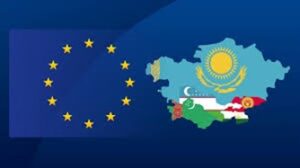
On April 3-4, the first-ever summit meeting between the EU and Central Asian countries will take place in Samarkand. This landmark event will open a new page in relations between the regions, marking a transition to a qualitatively new level of multilateral cooperation.
Since the emergence of newly independent states in Central Asia, the EU has been working to establish bilateral partnerships with them. Since 1991, the development of the EU’s strategy in Central Asia has gone through several important stages, which were driven by changes in the system of international relations, the dynamics of European integration, and the role of Central Asia in global politics.
The first large-scale program of cooperation was the Technical Assistance to the Commonwealth of Independent States (TACIS, 1991-2006), which supported the countries of the region in political and economic reforms, transition to a market economy and strengthening the rule of law. More than 3,000 projects were implemented under this initiative, totaling more than €7 billion. The key achievement of TACIS was the conclusion of Partnership and Cooperation Agreements with the countries of Central Asia.
Another important milestone was the adoption of the first EU Strategy for Central Asia in 2007. This period was marked by the beginning of the perception of Central Asia as a single region. A mechanism of annual meetings at the level of foreign ministers was created.
The policy of neighborhood and regional partnership implemented by the Republic of Uzbekistan under the leadership of President Mirziyoyev made a significant contribution to the rethinking of the strategy. As a result of joint efforts, a completely new political atmosphere has emerged in Central Asia. In a few years, many problems that had been accumulating for decades were resolved. As a result, the region is becoming a space for mutually beneficial cooperation and sustainable development.
In other words, Central Asia is no longer just a bridge between the East and the West, as it was traditionally perceived, but an independent actor in international relations.
Central Asian states are interested in attracting European investments, technologies and innovations for sustainable development. The EU is actively cooperating with the regions in politics, security, trade, investment, and cultural and humanitarian relations, strengthening the legal framework for cooperation. Kazakhstan and Kyrgyzstan have already signed partnership agreements with the EU, and Turkmenistan, Tajikistan, and Uzbekistan are preparing to sign theirs. In October 2023, a Joint Roadmap was adopted to deepen ties between the EU and Central Asia.
In recent years, Brussels has been building relations with five Central Asian states under Comprehensive Partnership and Cooperation Agreements. To date, Kazakhstan and Kyrgyzstan have already signed such agreements with the EU. In March 2024, Turkmenistan signed a protocol to the Agreement, and Tajikistan and Uzbekistan are finalizing preparations for signing the document.
An additional impetus to the development of cooperation was given by the adoption in October 2023 of the Joint Roadmap for Deepening Ties between the EU and Central Asia.
The European Union remains the largest investor in Central Asia, accounting for more than 40% of foreign direct investment over the past ten years (over €100 billion).
One of the areas of strategic partnership is the development and processing of mineral resources. In the context of diversification of supplies of critical materials, Central Asian countries are playing an increasingly important role in the global market. The signed Memoranda of Understanding with Kazakhstan (2022) and Uzbekistan (2024) allow European companies to intensify cooperation with the region’s countries in high-tech areas.
Among the infrastructure projects aimed at developing the region’s logistics potential, the China-Kyrgyzstan-Uzbekistan railway project plays a special role.
A new impetus to the development of cooperation was given by the results of the first investment and transport forum of Central Asia and the EU, held in January 2024 in Brussels. During the event, it was announced that 10 billion euros would be allocated to modernize the Trans-Caspian International Transport Route connecting Asia and Europe.
Another important area of partnership with the EU is the digital integration of Central Asia into the global economy. In March of this year, during the regional visit of EU Commissioner J. Sikela, the TEI Digital Connectivity project was launched to develop satellite communications, expand broadband Internet access, support digital innovation, and improve cybersecurity.
The fight against climate change and the transition to sustainable development remain a key aspect of cooperation, with the main initiatives being the SECCA project under the Team Europe strategy, the CAWEP Water and Energy Program, and Green Central Asia.
The EU remains not only an important trade, economic, and investment partner for the region, but also a key benchmark in the field of sustainable development, digital transformation, and environmental programs.

DIM Company announces the beginning of strategic partnership with TASkombank, within the framework of which special privileges are provided for the purchase of real estate in DIM residential complexes, the press service of the developer reported.
“We at Private banking know: home is more than walls, it is a place where dreams and living inspiration are born. We have joined forces with DIM, TAScombank has prepared unique opportunities for its Private banking clients: a 3% discount for the purchase of housing in the eco-complex business class Park Lake City”, – said Oleg Polyak, First Deputy Chairman of the Board of TAScombank.
Eco-complex business class Park Lake City became the first project from the portfolio of projects of the company DIM, where there are exclusive terms of purchase and payment for real estate. In the near future other projects of the company will be announced, where special conditions for potential investors of the company and unique offers for TASkombank Private banking clients will be introduced.
“The partnership between TAScombank and DIM is a confirmation of our reliability and stability in the realization of our projects. In the future, the partnership between banks and developers will become even more necessary and important, as developers will be able to provide stable financing for their projects, avoid delays in construction, increase the confidence of buyers, and special programs with favorable lending terms will make the purchase of housing more affordable for the general public,” said Arseniy Nasikovsky, junior partner of DIM.
DIM Group was founded in 2014 and specializes in the full cycle of development, including design, construction and property management. During this time, the company has commissioned 15 houses in eight LCDs, a total of 3,640 apartments, built more than 332.7 thousand square meters of residential and commercial space. In 2024 DIM commissioned 1191 apartments in three complexes – New Autograph, Lucky Land and Park Lake City. Six residential complexes of “comfort+” and “business class” category are under construction: Metropolis, Park Lake City, Lucky Land, A136 Highlight Tower, Olegiv Podil, The One.

Ukrainian Foreign Minister Dmytro Kuleba and U.S. Secretary of State Antony Blinken reaffirmed the importance of the strategic partnership between Ukraine and the United States.
“In our first call today Antony Blinken and I affirmed the importance of the Ukraine-U.S. strategic partnership. We agreed to raise the level of amtition and begin a new day in our relations. Grateful for the unfaltering U.S. support of Ukraine’s sovereignty and territorial integrity,” Kuleba wrote on his Twitter on Monday night.
“It was our first conversation. The Secretary of State indicated at the very beginning that he wanted to talk with Ukraine one of the first […] We agreed on the main thing – to fill our strategic partnership with new ambitions,” Kuleba said on the Freedom of Speech television program on ICTV.
The minister said the conversation with U.S. Secretary of State Blinken was planned last week and did not take place for technical reasons.